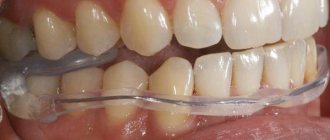“Everyone says that health is most valuable; but no one observes this.”
— Kozma Prutkov
Attitudes towards dental health are changing: many regularly go for checkups, have their teeth professionally cleaned, and if they undertake treatment, they plan to “get everything in order.”
There is also another approach: people go to the clinic “when they get sick,” and having solved the problem, they disappear “until a new case occurs,” apparently not wanting to spend more on health than is necessary now.
A story about an integrated approach to dental treatment will be useful for everyone, because it allows you to regain your health and not overpay for treatment. Yes, yes, an integrated approach, including saving money!
a comprehensive treatment plan is and then illustrate what the savings are.
What is a comprehensive dental treatment plan?
A comprehensive plan is a treatment and preventive measure, the goal of which is a sanitized (healthy) oral cavity.
Dentists have a list of requirements for oral health:
all caries and its complicated forms (pulpitis and periodontitis) were cured; all fillings, inlays and crowns with defects in the oral cavity were replaced; no foci of chronic infection; dental deposits were removed; mucous membranes and gums were removed without signs of inflammation; all 28 teeth were present (full dentition!) all teeth have the correct anatomical shape, no pronounced orthodontic disorders
Since it is impossible to prescribe the correct treatment without finding out the cause of the disease, a diagnostic examination . The required minimum is photographs of the jaws (orthopantomogram) and an examination by a dentist-therapist.
A complete diagnosis may include consultations with an orthopedist, surgeon, implantologist, orthodontist, periodontist, other specialists (anesthesiologist, ENT doctor, allergist) and additional research:
- CT scan
- temporomandibular joint examination
- photographing a face
- production of diagnostic models
- modeling of orthopedic structures
- creation of wax-up and mock-up models of teeth
- planning the surgical stage of treatment
After a diagnostic examination, the doctor draws up a treatment plan that allows you to eliminate all identified disorders in the oral cavity.
The doctor offers at least two options:
- Recommended Treatment Plan (Best Option!)
- An alternative treatment option , which usually involves a lower cost due to the use of simpler technologies and materials.
, an executable treatment plan can be drawn up that takes into account the financial capabilities and other limitations of the patient.
When refusing the recommended plan , which, in the doctor’s opinion, is the best treatment option, you need to be aware of all the possible consequences of unresolved problems in the oral cavity and be prepared to accept the shortcomings of simpler technologies and materials.
But it’s better to choose an economical option than to let your health take its course by postponing dental treatment “until better times.”
After signing the plan, you can begin treatment!
Treatment planning
Initially, a diagnosis is made, which includes the following points:
- visual assessment of the condition of the oral cavity, mucous membrane, tooth surface, level of enamel abrasion, presence of tartar, etc.;
- pictures are taken to obtain information about the condition of bone tissue and tooth roots;
- To control the enamel, it will be necessary to remove tartar, since underneath there are pockets of caries or subsequent signs of demineralization;
- The correctness of the bite and occlusion are assessed, as this affects the condition of bone tissue, enamel, and the distribution of load during chewing.
Information about previous illnesses, whether other procedures were performed, and how the visitor’s health status is assessed at the moment will also be useful.
When developing an action plan, the dentist takes into account the need to eliminate the following problems:
- A complete sanitation of the oral cavity is carried out, tartar is removed, plaque is removed, and hygienic actions are carried out to minimize the possibility of infection or inflammation during treatment.
- Treatment of caries and pulpitis is carried out. This is necessary in order to eliminate places where pathogenic microorganisms develop in the oral cavity.
- Periodontal treatment is carried out, namely gum treatment, inflammation is relieved, procedures performed for periodontal disease and periodontitis are prescribed.
- The bite is adjusted as necessary. Braces and mouthguards are intended for these purposes. The condition of the dentition is normalized, the entire dentofacial section is brought back to normal.
- At the final stage, prosthetics or implantation are performed, all missing dental units are completely restored.
If one of the activities is not considered necessary, it is skipped. However, the general sequence of all actions remains unchanged. For example, there is no point in trying to cure gums without sanitizing and eliminating caries, because the sources of infection remaining in the mouth will certainly provoke the inflammatory process to reoccur. Dental restoration is never performed at the initial stage if the bite has not been corrected, since the implant should not be under pressure caused by the load of the braces or mouthguard.
Why does planned treatment save money?
After reading the list of requirements for dental health and assessing the volume of diagnostic tests, you can’t help but think: “What kind of savings can we talk about if we need to do all this?”
Let's not lie - dental treatment is not cheap! Therefore, when we talk about saving, we first of all mean that prevention and timely treatment can protect us from major health problems.
Secondly , planning in any matter, including treatment, is an opportunity to foresee the consequences of certain actions, reducing the likelihood of errors, and therefore costs, to a minimum.
What is well known to dentists is sometimes not obvious to ordinary people, so now we will demonstrate how treatment becomes more complicated and more expensive if dental diseases occur.
Where can I get qualified help?
At Sanident comprehensive dentistry, all patients receive timely and qualified care. For the convenience of visitors, a flexible system of discounts is constantly operating, and a guarantee is provided for all types of services.
At the first visit, each of our patients undergoes a consultation with a dentist, and this is all done absolutely free of charge. The entire range of activities, including the diagnosis of dental diseases using the most advanced equipment, is carried out so that a visit to our clinic does not cause negative emotions and feelings of internal discomfort in visitors. We provide a full range of dental services in the urban district of Ivanteevka and Shchelkovo.
Caries - the deeper, the more expensive
If at the initial stage of caries there is a chance to cure it without even drilling the teeth, then with deep caries it may be necessary to treat the canals and restore the tooth with a crown.
Read about the treatment of caries at different stages in the articles:
- How to treat caries? Today using the Icon method or tomorrow drilling with a bur?
- Caries: what is it like? And why does treatment differ so much in price?
Dentist consultation
If you need a dental consultation in the center of Moscow, on Chistye Prudy, use the services of the Dentist clinic. By contacting
dental clinic "Dentist"
, you will find:
- Professionalism
. - Efficiency.
- Hi-tech.
- The widest range of dental treatment services in the center of Moscow.
Our specialists are highly professionally trained and have extensive experience in treating a wide variety of pathologies of the dental system, which allows us to provide high and stable treatment results and solve problems for patients of any level of complexity!
An integrated approach to the patient’s problem means the joint work of an implantologist, periodontist, orthopedist and therapist and remains the leader in our clinic. Feedback from patients testifies not only to the qualifications of doctors, but also to their attentive attitude towards everyone and their focus on obtaining the most effective result for the patient.
IMPORTANT:
A successful dental clinic that strives to constantly keep pace with the progress of medical technology cannot do without modern equipment.
The equipment of a clinic is an indicator of the level of its specialists
. The key to successful dental treatment lies in competent medical tactics and high technical equipment. It is these components that we are ready to offer you in our clinic!
In the process of diagnosis and treatment, we use only certified materials and equipment. All the clinic’s instruments, diagnostic devices, materials are only from well-known global manufacturers!
Why do you need a dental consultation?
Consultation with a dentist is the first and important step in obtaining qualified medical care for problems of the dental system. The aesthetic result of dental treatment should not depend
solely on the technical capabilities and ideas of the dentist and dental technician about beauty, it is necessary to take into account the patient’s opinion, as well as his understanding of the problem and ways to solve it. Consultation is necessary to inform the patient that in order to achieve a positive result of dental rehabilitation, a certain set of therapeutic measures is required, in which the patient himself must directly participate. However, in order to realize this task, the doctor is required to have a high level of professional training, with knowledge of modern treatment methods. That is why, if you need a specialist who is focused on the most effective and aesthetic result of dental treatment, contact
Dentist
dental clinic for a consultation .
The doctor will carefully examine the situation in the oral cavity and, if necessary, use various diagnostic techniques. Interpretation of the results obtained will make it possible to give clear recommendations to the patient regarding the essence of the existing problem and ways to solve it. A dental clinic with a free consultation
with a doctor is also a very advantageous offer.
What does a dental consultation include?
Dental consultation includes the following stages:
1. Analysis of the patient’s complaints, reasons for his visit to the clinic, as well as collection of anamnesis, then
there is information about the presence of concomitant diseases, allergies to medications or metals, and medications taken. Withholding any information can be dangerous. In particular, advance information about intolerance to the anesthetic will allow you to take a more careful approach to choosing a remedy and settle on a safe, but no less effective option. If there is information about an existing pregnancy, the doctor will also be able to more clearly plan a treatment plan and the course of future procedures. You shouldn’t hide bad habits from a specialist. A long history of smoking can become a serious obstacle to implantation.
2. Intraoral camera.
The examination of the oral cavity is performed under the control
of an intraoral camera.
The condition of the teeth, their anatomy and position are studied, lesions and developmental anomalies are identified, and the appearance of the gums is also examined. In addition, the condition and strength of fillings, crowns, implants, and removable dentures are subject to study. The camera allows the patient to clearly and clearly see the condition of the teeth. Thus, the patient can see for himself the effectiveness of our treatment, and the dentist’s diagnosis and conclusion become clearer and clearer for the patient.
3. KaVo DIAGNOcam
- a device for diagnosing carious lesions. Full
Diagnostic visualization KaVo DIAGNOcam gives you complete confidence in the accuracy of the diagnostic result. With its help, you can detect carious lesions at a very early stage of development, see enamel cracks without the use of a dental microscope, and also diagnose secondary caries on previously installed fillings, without the use of X-ray examination.
4. Additional diagnostics are usually based on x-ray techniques
. However, in our clinic, if necessary, we will be able to use computer technology. They can significantly increase the information content of the result and its reliability.
What is a comprehensive dental consultation?
In our clinic, consultations have their own characteristics
, and we think so
the approach is completely reasonable and correct for the patient.
In most dental clinics, consultation is carried out by a dental therapist, or the patient, according to his own understanding and understanding, signs up for a consultation with a specialist (orthodontist, implantologist, surgeon, orthopedist). This approach is fundamentally wrong. Using a consultation with an integrated approach to the patient’s problem is the most effective and diagnostically correct.
Our consultation is conducted by a doctor who combines two specialties, an orthopedic dentist-therapist. Why?
Such a specialist, combining two specialties as a dentist-therapist-orthopedist, has extensive experience in the field of therapeutic dentistry, endodontics (canal treatment), prosthetics and extensive knowledge in the field of periodontics, implantation and orthodontics, which will allow for the most complete consultation using modern diagnostic methods , identify the cause, make a correct diagnosis and propose the optimal treatment plan. The patient does not have to go from one specialist to another, everything happens in real time.
Dentist therapist-orthopedist at the Dentist clinic
is the leading specialist in the treatment of the patient, and he coordinates the actions of specialist doctors: periodontist, orthodontist and implantologist. Involving highly specialized specialists in the work will allow you to correctly build a treatment plan and improve the quality of the service provided.
IMPORTANT:
At the same time, the specialist conducting the consultation at the Dentist clinic will be able to independently provide the necessary dental care in full.
Comprehensive dental consultation
allows you to study the opinions of different specialists, take into account all the individual characteristics of the patient’s dental system and choose the most suitable one from several treatment options. That is why, in an effort to provide the highest quality dental care to patients, our clinic’s staff, in addition to dental therapists and orthopedists, includes periodontists, surgeons, implantologists, gnatologists, and orthodontists.
When is a comprehensive consultation needed?
You can contact the Dentist dental clinic for a consultation with a variety of dental problems. Most patients with dental problems: abrasion, incorrect
bite, before prosthetics for missing teeth, bleeding gums,
they themselves decide which doctor they need and, without a doubt, sign up for a consultation with either an orthodontist, or an orthopedic dentist, or an implantologist. And they make the first mistake by making an appointment with a specialist for a consultation, bypassing a general dentist who combines the two specialties of a therapist and an orthopedist.
This is especially true for patients suffering from malocclusion! It is important to understand that malocclusion and dental deformation have many negative consequences. And now the most important question arises: is it necessary to immediately begin orthodontic treatment, and then eliminate the consequences of malocclusion, or vice versa?
Answer:
Unsuccessful results of dental treatment are obtained by those patients who directly contact a specialist.
The value of a narrow specialist lies in the fact that in his field he not only has extensive knowledge, but also extensive practical experience. However, the experience and knowledge of a specialist doctor is not enough to make a correct diagnosis, determine the strategy and sequence of treatment for patients.
Consultation with a dentist-orthopedist at the initial stage is necessary if
Restoration work is expected in the area of the front teeth after orthodontic treatment. As a rule, after orthodontic treatment, patients request aesthetic restorations.
that were not planned in advance before orthodontic treatment. It turns out that treatment is not enough to achieve a positive result. It is impossible either visually or practically to determine the boundaries of a future restoration with braces in the mouth.
Patients suffering from tooth wear directly turn to an implantologist to place an implant, not realizing that in the future there will be problems with subsequent prosthetics due to the lack of space for a crown on the implant.
Comprehensive dental consultation is most in demand in cases involving orthopedic dental treatment. The absence of two or more teeth can lead to chewing overload, which can provoke tooth destruction, wedge-shaped defects in the necks of teeth, bleeding gums, TMJ disease, and malocclusion.
Consultation with a dentist orthopedic therapist.
Consultation with a dentist is the first and important step in obtaining qualified medical care for problems of the dental system. In most dental clinics, consultation is carried out by a dental therapist, or the patient, according to his own understanding and understanding, signs up for a consultation with a specialist (orthodontist, surgeon, orthopedist). This approach is fundamentally wrong.
The Dentist clinic approached this issue more responsibly and logically. Application
consultation of an integrated approach to the patient's problem is the most effective and diagnostically
correct
.
The consultation here is conducted by a doctor combining two specialties, an orthopedic dentist-therapist.
Extensive experience in the field of therapeutic dentistry, endodontics (canal treatment), prosthetics and extensive knowledge in the field of periodontics, implantation and orthodontics will allow you to conduct a full consultation using modern diagnostic methods, identify the cause, correctly diagnose and propose an optimal treatment plan.
The orthopedic dentist is the leading specialist in the treatment of the patient, and he coordinates the actions of specialist doctors: periodontist, orthodontist and implantologist. Involving highly specialized specialists in the work will allow you to correctly build a treatment plan and improve the quality of the service provided.
As part of a free consultation:
- If necessary, instrumental tests are carried out (additional methods of examining the oral cavity will help in diagnosis, intraoral camera
and
laser
diagnostics KaVo DIAGNOcam.
) and
x-ray examinations
. It is very important that the patient receives all the necessary information, including graphic information, according to the “on the spot” principle, in a calm and confidential communication mode. The details of X-rays and videos can be examined down to the smallest detail, impossible with older technology - This allows the doctor to answer all questions at the consultation stage and involve the patient in active participation in discussing the paths and results of treatment. This can be achieved only through visually providing the patient with all possible model options for the upcoming treatment and stipulating the stages of treatment procedures.
- The result of a consultation with such a specialist will be a conclusion about the hygienic condition of the oral cavity, the presence of caries, various enamel defects, signs of periodontitis or periodontal disease. The results of previous treatment, the condition of fillings, implants, and prostheses will be assessed.
- The final stage is drawing up an individual treatment plan with information about the upcoming scope of medical intervention, and the need to involve specialized specialists and its sequence. During the consultation, you will be able to find out the exact cost of the upcoming work, and it will remain unchanged for the entire period of treatment.
IMPORTANT:
At the same time, the specialist conducting the consultation at the Dentist clinic will be able to independently provide the necessary dental care in full.
IMPORTANT:
Using a consultation with an integrated approach to the patient’s problem is the most effective and diagnostically correct.
Advantages of the dental clinic "Dentist" for a comprehensive consultation.
Dental clinic with free consultation
doctor is a very advantageous offer for any patient.
It is especially valuable that it comes from such a modern company .
Advantages of our clinic:
- Multifaceted approach
and continuity in the work of specialists. Their experience is to find the best solution when working with the most complex cases and to successfully solve the problem. - Free dental consultation.
- Constant technical improvement of instrumental diagnostics
expands prospects in recognizing pathology. The specialists of the Dentist clinic actively use this, introducing the most innovative and modern diagnostic approaches.
Price.
It is difficult to find a doctor whose experience and competence the patient was completely confident in. To make this task easier, we offer to use the services of our clinic. Mastery of modern techniques, a large amount of knowledge, a thoughtful and responsible approach, a desire to do his job as well as possible – these are the qualities of a doctor that can be seen already during a consultation. As part of the consultation (1 hour), you will receive an opinion from a qualified specialist with extensive practical experience and an impeccable reputation. It turns out that a consultation with a dentist in the center of Moscow, on Chistye Prudy, will be carried out absolutely free of charge.
. All radiological, diagnostic and visual methods of examining a patient are carried out free of charge in our clinic, as part of a free consultation! During your appointment, you will be able to clarify the price of the upcoming treatment and compare it with your capabilities.
Just think about the tooth. I deleted it and forgot about it!
Some easily go for tooth extraction, apparently believing: “no tooth, no problem.” However, after removal, the load on neighboring teeth increases, and tooth displacement begins.
Tooth displacement and bone loss may complicate prosthetics in the future. To install an implant, a complex and expensive bone grafting operation will be required.
Read about this in the articles:
- Insufficient volume and quality of bone tissue are contraindications for the installation of implants. Solution to the problem - Bone grafting
- What awaits me if I need a sinus lift?
Diagnostics by an osteopath and psychologist
All patients who are indicated for complex prosthetics at Dial-Dent undergo consultation with a psychologist and osteopath. The help of these specialists is necessary during long-term treatment. The psychologist finds out the patient’s motives and expectations, determines whether the patient can cope with the difficult stages of treatment, and whether he is under stress (any treatment during a stressful period is fraught with complications). An osteopath helps the patient’s body adapt to the changes occurring in the dental system. Osteopathy is a branch of medicine that studies the structural and anatomical connections between various organs and parts of the body. Thus, changes in the cranial area (changes in bite and dental prosthetics in this case) will affect the condition of the neck and spine. An osteopath, using soft osteopathic techniques, corrects these changes. The patient visited the osteopath 5 times during the entire treatment process, each time noting an improvement in overall well-being, a release of tension in the cervical spine and temporal joints.
Gum health is important!
Good gum health is no less important than healthy teeth. Inflammatory processes in the gums can lead to tooth loss.
With gingivitis, the ligament that holds the tooth root in the bone tissue is still preserved and therefore the tooth is stable. But if treatment is not started in time, destruction of the periodontal attachment and bone tissue will lead to tooth mobility. The bone tissue holding the tooth can be completely resorbed.
Read about the prevention and treatment of inflammatory gum diseases in the articles:
- Why do you need professional dental hygiene?
- Why does the gum recede and the neck and root of the tooth become exposed? What to do to prevent and treat gum recession?
- An effective method of treating periodontitis using a diode laser Doctor Smile
Team of doctors
All doctors at the Ilatan Clinic are highly qualified dentists with extensive practical experience. Regular participants in international seminars and forums. They regularly improve their professional level, undergo internships and advanced training in leading domestic and foreign clinics. Our achievements speak for themselves. We give people beautiful smiles, which improves their quality of life and gives them self-confidence. Positive feedback from patients is our reward, an incentive to become even better, move further and help. They are necessary not only for other patients, but also for doctors.
A wide range of dental services positions the Ilatan clinic as a family dentistry. It successfully combines classical and advanced technologies, allowing you to achieve the best treatment results. We not only set affordable prices for comprehensive dental treatment, but also allow patients to independently choose the optimal format that best suits all conditions. Regular promotions and discounts make treatment and prosthetics even more affordable.
Pulling out a tooth: is it so harmless?
Patients who decide to remove a tooth without hesitation hope to solve the problem in this way. It is worth considering that the load of the removed unit is transferred to neighboring elements, which inevitably leads to displacement of the dentition. The consequence is jaw deformation, bite pathology with all the ensuing consequences.
Implantology is one of the most expensive dental services, it requires a lot of time, and includes bone grafting.
Each tooth performs one function or another, so a violation of the dentition can lead to the most unforeseen consequences, including pathologies of the lower jaw joint.
Gum health
The condition of soft tissues is no less important than the condition of teeth. In addition, the health of the tooth is determined by the condition of the gums that support it.
The stability of the tooth is ensured by the ligament in its root. With gingivitis, the gums lose their ability to hold a hard organ, as a result of which it begins to loosen. The bone material responsible for the stability of the tooth can be resorbed, leading to premature loss of a healthy tooth.
We hope that we were able to convince you of the need for timely dental treatment. Attention to the condition of the oral cavity is the key to a beautiful smile!
Almost everything depends on your desire
Many factors influence human health; of course, not everything in life can be controlled, but what has a permanent and noticeable effect on health is in your hands.
Let's list the main factors affecting health:
- heredity
- random circumstances
- environment (nature, climatic conditions)
- lifestyle (nutrition, physical activity, working conditions, material and living conditions)
- healthcare
By the way, taking care of our own health is not only our good will, but also our duty.
Article 27. Federal Law No. 323-FZ “On the fundamentals of protecting the health of citizens in the Russian Federation”: “Citizens are obliged to take care of maintaining their health.”
And since maintaining good health is easier than restoring it in medical institutions, it is very important to realize your own responsibility for health and do it better at a young age.
The patient is an active participant in the treatment process!
We just realized that we are responsible for our own health and if for any reason we need treatment, we must become an active participant in it.
“I didn’t know... I wasn’t warned... The doctor didn’t tell me,” that’s enough of such excuses.
The patient is the most interested person, because we are talking about their own health!
Be interested in everything the doctor says, ask and clarify until you figure it out. No one has the right to reproach you for such an active life position.
Your right to information is enshrined in law.
Article 20. Federal Law No. 323-FZ “On the fundamentals of protecting the health of citizens in the Russian Federation”: A necessary precondition for medical intervention is the giving of informed voluntary consent of the citizen or his legal representative to medical intervention on the basis of complete information about the goals provided by the medical worker in an accessible form , methods of providing medical care, the risks associated with them, possible options for medical intervention, its consequences, as well as the expected results of medical care.
According to the law, the doctor has the right to begin treatment only with the written consent of the patient.
To obtain such consent, the doctor is obliged to explain in detail, in a form understandable to the patient, what he plans to do and for what purpose, what possible complications are possible and what treatment results he predicts.
And quality treatment begins with a correct diagnosis.









